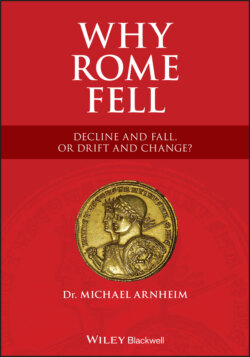Читать книгу Why Rome Fell - Michael Arnheim - Страница 11
Divided Loyalties in a Fractured Society
ОглавлениеHowever, the answer to our question must be sought largely in internal factors, and, in particular, in the divided loyalties of a fractured society, exactly the opposite of Gibbon’s “indissoluble union and easy obedience” of the first two centuries of the Principate. The sentiment expressed in the famous line by Horace (65–8 BCE), Dulce et decorum est pro patria mori (It is sweet and fitting to die for your country), was probably widely shared during the Pax Romana (the Roman Peace) of the same period. (Horace Od. 3.2.)
When we come to the fourth century, we even hear of young men cutting off a thumb to beat the “draft.” Judging by the number of laws against this practice, it may not have been as rare as modern writers tend to believe, and it so infuriated Valentinian I that, in 368, he ordered offenders to be burned alive. (CTh. 7.13.5.) There is no shortage of evidence of the unpopularity of conscription among the men themselves, and also among the large landowners whose duty it was to provide recruits.
The sack of Rome by the Goths in 410 and the Vandals in 455 elicited a great outpouring of grief among Christians and pagans alike, yet loyalty to the regime was generally so low among its subjects that the “barbarian” incursions generally met with very little resistance. This was the case even though the senatorial aristocracy undoubtedly benefited from having an overarching imperial structure in the West, enabling them to continue to combine office, land, and wealth in several provinces at the same time, which, however, effectively made them a centrifugal force. But, with their fortified estates, especially in Gaul, their disinclination to pay taxes, and their gradual control over the Church, many of them preferred to curry favor with their new masters rather than to attract their ire.
